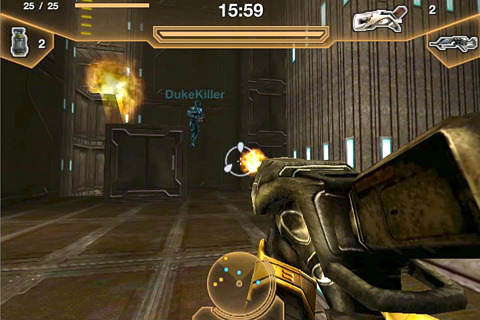There are many types of games available on the iPhone right now, though original FPS titles on the system aren’t plentiful. Developer MunkyFun and publisher Villian are looking to change that with what they describe as a full-featured online FPS in Archetype. We talked with Villian founder Dane Baker about marketing a FPS on iPhone as compared to consoles and the balance between cost and “freemium.”
How are you looking to capitalize on the early buzz for Archetype?
Dane Baker: Early buzz for Archetype is, truth be told, a happy accident. We rolled out the game in several European countries to make sure our servers can handle the launch onslaught, only to discover users uploading wonderful YouTube clips of the game’s intro sequence, gameplay, and more. So for us, early buzz was not manufactured; it’s the iPhone/iPod touch community telling us that Archetype fills a need in a big way.
As for capitalizing on the buzz, we have a sort of “facilitator” role in engaging the community of mobile gamers while providing a stage for fans to play on. Discussing feedback with fans, keeping them informed of our plans (particularly the hardcore fans) — in short, addressing their needs. For Villain, the customer is king.
What way are you looking to emphasize impulse buying for the game?
Dane Baker: The old saying is true: you don’t get a second chance to make a first impression in the App Store. So we start by managing early expectations while timing our launch to strike all at once. Supply/demand metrics don’t apply in a digital market, so you can’t drive impulse buying by making the game scarce. Apple’s approach is useful to us too, in that the product is the marketing. If the game sucks, or is inadequate in some major way, all the planning in the world isn’t going to make gamers impulsively purchase it.
 Watch out for DukeKiller!
Watch out for DukeKiller!
Will the online FPS features see a lot of emphasis in how you look to promote Archetype?
Dane Baker: Absolutely. Archetype has no “offline” features aside from a training level, so for us the online multiplayer aspect is everything. On a mobile platform like iPhone, this is ideal as people want to be connected to other people with similar interests, even through their phone.
What sort of new philosophy is Villain as a publisher starting out bringing to both marketing and business models?
Dane Baker: In this day and age it’s hard to find a truly new philosophy, even in the mobile space. So it really boils down to believing in what works — having a customer-centric marketing and business model isn’t about paying lip service to some cranky customer. It’s about infusing every crevice of your product with care — again, the Apple approach. I hear they’re doing okay . . .
How is what you’re doing different and similar to traditional console game efforts?
Dane Baker: Good question. In the console space we’re seeing astronomical development budgets during this generation, and many think it’s going to just get worse. This means not only fewer games but safer games — you can’t blame the publishers, though. If you’re spending $20 million on a single PlayStation 3 title, you’d better be sure it’s going to sell. This is an entirely different universe from the mobile games market. Both have so-called walled gardens, but Apple is perhaps less strict and less hands-on than traditional publishers. So anyone with programming knowledge can play. Developing for Apple devices amplifies the risks and rewards.
As for similarities, the one common thread regardless of platform is the goal of creating high quality experiences. That said, our development process relies heavily on having strong creative, vision and disciplined processes that ultimately deliver on that promise. Today’s market leaders are the developers that build exceptional quality into every nook and cranny of their games, particularly in the mobile space. Consumer feedback and opinion is key, so similar to traditional development, the average gamer is central to everything we do. Typically this involves testing and rigorous QA along with post-ship initiatives.
Tell me about the business model balance between cost and freemium titles.
Dane Baker: This is something we feel pretty strongly about at Villain. Freemium can work, I just don’t think it is working in the App Store so far. Looking at the ongoing top 10, one can’t help but notice few freemium titles, and customers are pretty vocal about the reasons. Freemium can sometimes mean that customers don’t get the deal they thought they were getting. This may not be done on purpose but there’s an understandable backlash that leads to some pretty heavy skepticism about the entire model. I think there are solutions but they aren’t being implemented (yet).
In contrast we prefer to be extremely upfront with our customers. $2.99 (‚¬ 2,39 in Europe) is the cost for our first game, Archetype, and that’s it. No fine print, ever. Gamers decide whether we get to keep coming into work in the morning.

